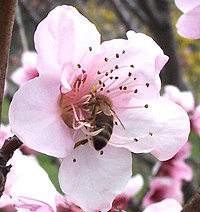
Photo from wikipedia
Abstract Background Organic products of animals are getting more accepted by consumers. Using herbal additives may lead to more health animal products. In this research it is hypothesized that Lavandula… Click to show full abstract
Abstract Background Organic products of animals are getting more accepted by consumers. Using herbal additives may lead to more health animal products. In this research it is hypothesized that Lavandula angustifolia and/or Mentha spicata essential oils would be helpful to enhance production performance in laying hens. Objectives This experiment was conducted to evaluate the effects of Lavandula angustifolia and Mentha spicata essential oils on performance, egg traits and blood variables in laying hens. Methods 144 Lohmann LSL‐Lite laying hens from 42 until 56 weeks of age were used in a completely randomized design in four treatments and six replicates (six birds per replicate). The treatments consisted of: (a) control group (basal diet), (b) basal diet supplemented with 250 mg/kg diet lavender essential oil (LEO), (c) basal diet supplemented with 250 mg/kg diet mint essential oil (MEO), and (d) basal diet supplemented with both LEO and MEO. Results Using LEO and/or MEO did not affect body weight changes, feed intake, egg weight, egg index, yolk index, Haugh unit, egg shell weight and egg shell thickness. Feeding LEO, individually or in combination with MEO, did not affect FCR compared with the control group (p < .05), however, feeding MEO individually increased feed conversation ratio (FCR) compared to LEO and the control group during 42–56 weeks (p < .05), as well as decreasing egg mass compared to LEO (p < .05). Feeding LEO increased egg production compared to MEO and combination of MEO and LEO (p < .05). Conclusions In conclusion, dietary supplemental MEO (250 mg/kg) may increase FCR, and LEO (250 mg/kg) is more effective than MEO (250 mg/kg) for egg production and egg mass purposes; besides MEO (250 mg/kg) negatively affected FCR compared with the control group. In addition, no specific beneficial effect of dietary supplemental MEO and/or LEO on the other measured variables was detected.
Journal Title: Veterinary Medicine and Science
Year Published: 2020
Link to full text (if available)
Share on Social Media: Sign Up to like & get
recommendations!